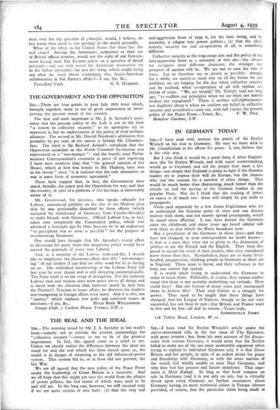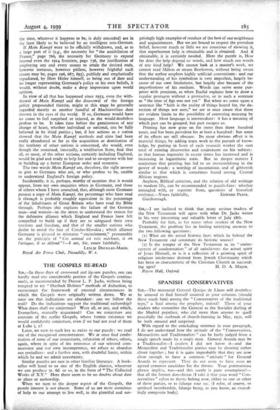IN GERMANY TODAY
SIR,—I have read with interest the article of Sir Evelyn Wrench on his visit to Germany. He says we must stick to Mr. Chamberlain in his efforts for peace. I, too, believe that is the only way.
But I also think it would be a good thing if other EnElish- men like Sir Evelyn Wrench, and with equal understanding, would go to Germany and tell the people they meet a few things—not simply that England is going to fight if the German leaders try to impose their will on Europe, but the reasons why and the reasons for a number of other things. That would be much better than threatening, much better than the attacks on and the guying of the German leaders in our popular Press. Nor do I think that the sending of letters en masse is of much use: these will simply be put aside as propaganda.
Visits paid separately by a few dozen Englishmen who try to understand the German point of view and can discuss matters with them, and not merely spread propaganda, would be much more effectual. I, too, have known the Germans since my childhood, and many years ago heard similar talk over there to that which the Nazis broadcast now.
But a peculiarity of the Germans in those days—and they have not changed, as your correspondent no doubt knows— is that as a mass they were not so given to the discussion of politics as are the French and the English. They were dis- posed to accept the word of their leaders, who they considered knew better than they. Nevertheless, there are as many level- headed, unaggressive, thinking people in Germany as there are in England. These want to know, and their influence in the long run cannot but spread.
It is worth while trying to understand the Germans in order to teach them. Politically, of course, they cannot under- stand that there is any morality underlying our attitude. How could they? Has the history of many years past encouraged them to believe this? They read history as a struggle for power. They need to be taught that these things have changed, that the League of Nations, though so far not very successful, has not been in vain ; that Britain and France want to live and let live—all and in reason.—Yours truly,
Snt,—I have read Sir Evelyn Wrench's article under the above-mentioned title, in the last issue of The Spectator, with great interest ; but, from his own account of his discus- sions with various Germans, it would seem that Sir Evelyn failed to make use of the one most answerable argument when trying to explain to individual Germans why it is that Great Britain and her people, in spite of an ardent desire for peace and friendship with Germany, as with the other nations of the world, feel wholly unable to trust Nazi Germany, and why they fear her present and future intentions. That argu- ment is Mein Kampf. So long as that book remains on sale in Germany (and it is not only on sale, but is virtually thrust upon every German) no further assurances about Germany having no more territorial claims in Europe (always provided, of course, that the particular claim being made at
the time, whatever it happens to be, is duly conceded) are in the least likely to be believed by an intelligent non-German. If Mein Kampf were to be officially withdrawn, and, as to a large part of it (e.g., the necessity for "the annihilation of France," page 766, the necessity for Germany to expand beyond even the r9r4 frontiers, page 736, the justification of employing any and every means to attain the desired ends, however tortuous, however pitiless, however frightful such means may be, pages 196, 687, 693), publicly and emphatically repudiated, by Herr Hitler himself, as being out of date and no longer representing Germany's policy or his own beliefs, it would, without doubt, make a deep impression upon world opinion.
In view of all that has happened since 1933, even the with- drawal of Mein Kampf and the disavowal of the foreign policy propounded therein, might at this stage be generally regarded merely as another handful of Machiavellian dust thrown in the eyes of the world. If so, Germany would have no cause to feel surprised or injured, as she would doubtless profess to be. It takes time before the genuineness of any change of heart, whether individual or national, can be fully believed in by third parties ; but, if her actions as a nation showed that the Mein Kampf methods and aims had been really abandoned so far as the acquisition or domination of the territory of other nations is concerned, she would, even though she remained, internally, a totalitarian State, find that all, or most, of the other nations, certainly including England, would be glad and ready to help her and to co-operate with her in building up a better European order and economy.
The two words Mein Kampf are, therefore, the right answer to give to Germans who are, or who profess to be, unable to understand England's foreign policy.
Incidentally, it is, perhaps, worthy of mention that it would appear, from my own enquiries when in Germany, and those of others whom I have consulted, that, although most Germans possess a copy of Mein Kampf, the percentage who have read it through is probably roughly equivalent to the percentage of the inhabitants of Great Britain who have read the Bible through. Perhaps this explains the failure of the German man—and woman—in the street to understand the reason for the defensive alliance which England and France have felt compelled to build up if they are to safeguard their own territory and freedom, and that of the smaller nations who desire to avoid the fate of Czecho-Slovakia ; which alliance Germany is pleased to misname " encirclement," presumably on the principle of "Cet animal est tres mechant, si on l'attaque, ii se defend"!-1 am, Sir, yours faithfully,
LESLIE DOUGLAS-MANN.
Royal Air Force Club, Piccadilly, W. r.









































 Previous page
Previous page